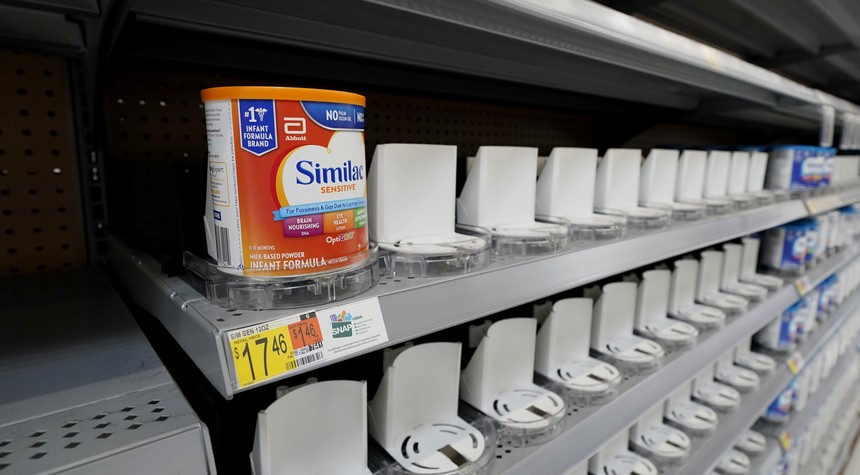Why Did It Take So Long For the White House to Deal With the Infant Formula Crisis?
It’s a good thing for Joe Biden that the American media is eager to protect him from the fallout of his incompetent leadership. Otherwise, he might be in real political trouble.
Biden flubbed it. The crisis of infant formula shortage was, perhaps, unavoidable — at least to a small degree. But examining the timeline of actions taken by the FDA to deal with the crisis and the actions of the Biden administration to deal with it, it becomes clear that the shortage didn’t have to be so acute and that the delayed reaction from the White House in identifying the problem as a crisis contributed to the panic.
First, the good news. The FDA and the largest manufacturer of infant formula in the United States, has reached an agreement to reopen the plant in Sturgis, Mich. The closure of that plant was the proximate cause of the shortage because that single plant supplied most of the specialty formula and a large percentage of regular formula to the American consumer.
Production of several formula products was halted early last February when a rare form of bacteria was believed to have infected at least four infants and the FDA identified the Sturgis plant as the point of origin. Abbott has vigorously denied that the bacteria originated in their Sturgis plant, citing the fact that the specific bacteria has not been found at their plant.
Related: The Baby Formula Shortage Could Have an Effect on the Midterms
It wasn’t the first time the Sturgis plant had been cited by the FDA for violations. The agency received a whistleblower report last fall detailing sanitation problems at the plant.
Inspection reports by the Food and Drug Administration, as well as a 34-page whistleblower report from a former employee of Abbott Laboratories, suggest the FDA first became aware last fall of suspected sanitation issues at an Abbott facility in Sturgis, Michigan. But it wasn’t until mid-February after the agency detected deadly bacteria inside the plant that Abbott issued a voluntary recall — a drastic move that syphoned off a significant portion of the nation’s supply.
Months after that, concerns still remain about what is taking so long to get the facility running again safely, as families scramble for access to formula.
“We are confident that we can continue to produce safe, high-quality infant formula at all of our facilities as we have been doing for millions of babies around the world for decades,” the company said. Indeed, the FDA inspection of the plant last September found only minor infractions.
But in October, a whistleblower accused Abbott of hiding infractions from the FDA.
Oct. 20, 2021: In a 34-page document, a whistleblower at the plant alleges to the FDA that Abbott has been releasing untested infant formula, hiding information during past FDA audits and imposing lax cleaning practices. None of these claims have been independently verified. According to Rep. Rosa DeLauro, a Democrat from Connecticut, who later releases the whistleblower report, the FDA interviews that person in late December.
Feb. 1, 2022: The FDA collects samples at the plant that confirm the presence of the dangerous Cronobacter bacteria and cite several violations, according to an inspection report.
Start the clock. The FDA knew on the first day of February that there were going to be significant shortages of infant formula on the horizon. The conclusion was unavoidable given the heavy reliance on Abbott for most of the specialty formulas manufactured in the U.S. And yet it wasn’t until last week that the Biden administration went into crisis mode and revved up the PR machine.
By then it was far too late. All Biden could do is cover his tracks by offering a blizzard of recommendations to deal with the problem — none of which would put a single package of formula on store shelves.
Why was the FDA so slow to go into crisis mode despite knowing of the coming shortage? Did the White House try to cover up the FDA’s bungling? Why didn’t the White House raise alarms much earlier?
Some congressional committees will no doubt be asking these and many other questions of Abbott, the FDA, and the White House when this unnecessary crisis is finally resolved.

No comments:
Post a Comment